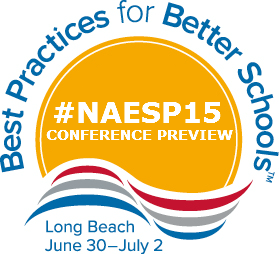Ease Tough Conversations
Communicator April 2015, Volume 38, Issue 8
 Communicator
Communicator
April 2015, Volume 38, Issue 8
Whether it’s a parent-teacher conference or resolving a disagreement with a staff member, principals are all too familiar with difficult conversations. NAESP recently spoke with Jennifer Abrams, author of Having Hard Conversations and a pre-conference speaker at NAESP’s 2015 Best Practices for Better Schools Annual Conference, about strategies to ensure that tough discussions are ultimately useful.
Q: What are the key words or phrases that principals should keep in mind when they’re approaching a challenging interaction?
A: When thinking of a challenging talk, anticipate that the other person might have a greater sensitivity to any word that comes out of your mouth. First, be mindful of your adjectives because they’ll end up causing such incredible emotion when a neutral word probably would have sufficed.
Second, fuzzy concepts will also cause people to get defensive if the concept isn’t well articulated. “You didn’t take enough initiative,” “You didn’t step up,” “I don’t sense that you’re really putting an effort in.” Those concepts end up being not descriptive enough for someone to grow from—the other person just ends up feeling judged.
Third, watch your pronouns. How many “I”s are you using? Using “I” too much, such as in “I noticed,” “I see,” and “I feel” can end up creating a power dynamic where you come out on top— But also check yourself when you use “you.” “You did this,” with an emphasis on the “you,” ends up feeling incredibly punitive. Add to this the “trigger” idea of the word “we” as in, “We really should take a look at this.” If the “we” is not honest, it comes across with such a patronizing and false sense of comradery that it could really turn someone off.
Q: What can a leader do to prepare for a difficult conversation with a staff member?
A: know how what you’re going to say aligns to what is already on the person’s “plate,” such as a standard, job description, or a performance expectation. The goal is to not come from left field—you should speak to that person about what is already a current expectation.
The second thing to consider is what you want to see, instead of what you already are seeing. Do not get into a hard conversation without knowing exactly what you are looking for in terms of an outcome. Be able to answer the question, “What do you want me to do instead?” Know the answer to that question before you get into the conversation.
Q: You suggest making sure conversations are growth-producing. What tactics can be used to keep a discussion growth-focused?
A: Ask questions such as: Is this doable? What supports would you need? How can I help you move forward in your practice? Unless people know exactly what we want to focus on and what that looks like, then they don’t know how to proceed. Then, Be ready with possible supports: resources, coaching, modelling—ways to really assist the person in growing.
Q: What would you say are common mistakes educators make when having conversations with parents?
A: Staying school focused, and not kid focused. When you have a challenging conversation with a family member, hit these three points:
- Explain what the school is going to do. Say, for example, “We will really take a look at what happens after Johnny comes back to class from the playground, and then we will make some shifts on our end.”
- Focus on the child. Say for example, “We’re going to work with Johnny to make changes.”
- Explain how they can help, saying for example, “Here’s what you can do as a parent to support the effort.” Don’t ask parents to do something that is outside their sphere of control.
Jennifer Abrams will lead a full-day pre-conference workshop at NAESP’s 2015 conference. To find out more and register, visit www.naespconference.org.
—
Copyright © 2015. National Association of Elementary School Principals. No part of the articles in NAESP magazines, newsletters, or website may be reproduced in any medium without the permission of the National Association of Elementary School Principals. For more information, view NAESP’s reprint policy


